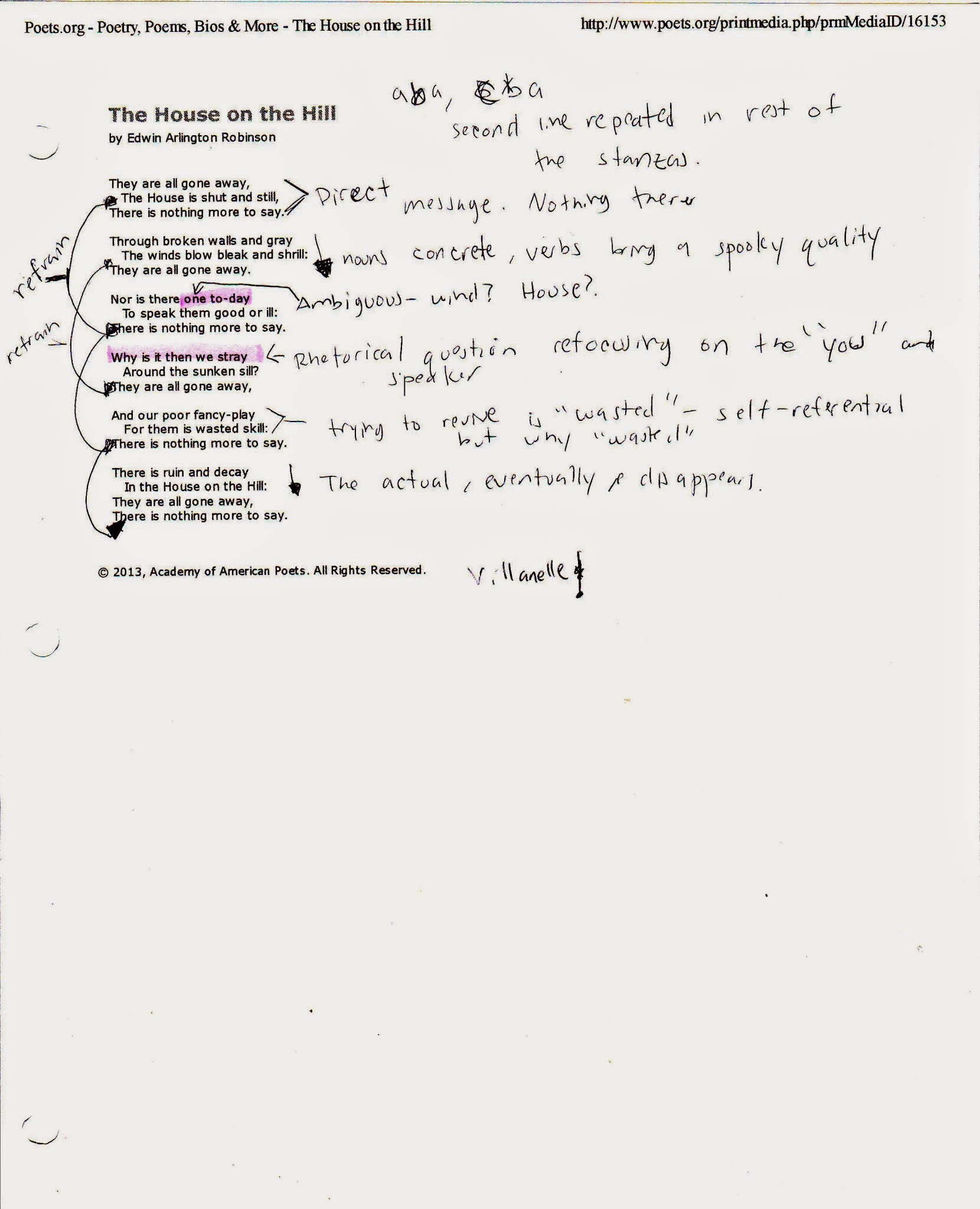Original Poem Reprinted Online Here: "The House on the Hill" by Edwin Arlington Robinson
More Information about the Poet: Edwin Arlington Robinson
More Information about the Poet: Edwin Arlington Robinson
This is a villanelle. Past me tried to make sense of the form and wondered why did the lines repeat themselves, and why the rhyme scheme. Distance does make things appear different.
But that's the point of this poem in particular -- how "they are all gone now" and how this distance changes the perspective of "the house on the hill."
So the two refrain lines in the poem are, "They are all gone away," and "There is nothing more to say." The first refrain has a somber tone of leaving and the second refrain has more of a mysterious quality since the poem, indeed, says something.
"Through broken walls and gray / The winds blow bleak and shrill: / They are all gone away. The first usage of the first refrain brings more of the after effects -- they are all gone only the broken and the bleak and shrill wind. Happy setting.
"Nor is the one to-day / To speak them good or ill: / There is nothing more to say." So the speaker emphasizes no one is there, but note the "nothing more to say line" comes in as though to end the setting and shift to a new idea.
"Why is it then we stray / Around the sunken sill? / They are all gone away," and here the rhetorical question is a bit subdues the introduction of the "we" a bit since the poem is very visually oriented, but this rhetorical questions asks the reader why are we still her reading this poem if nothing is there. They are all gone away, aren't they?
"And our poor fancy-play / For them is wasted skill: / There is nothing more to say." So the subject is a bit more focused here with the adjective of "poor" and even though the setting feels more from a horror story, the background narrative to this piece is the poor that had to leave. Think Great Depression. Think Dust Bowl. Both gloomy and dark.
There is ruin and decay
In the House on the Hill:
They are all gone away,
There is nothing more to say.
Now the ruin and decay plays a bit too much on the gloomy and dark, but note that the language adds a surreal element to loss, and by expanding the image to such proportions the concept of the poor is in the background compared to what is left behind.
So the two refrain lines in the poem are, "They are all gone away," and "There is nothing more to say." The first refrain has a somber tone of leaving and the second refrain has more of a mysterious quality since the poem, indeed, says something.
"Through broken walls and gray / The winds blow bleak and shrill: / They are all gone away. The first usage of the first refrain brings more of the after effects -- they are all gone only the broken and the bleak and shrill wind. Happy setting.
"Nor is the one to-day / To speak them good or ill: / There is nothing more to say." So the speaker emphasizes no one is there, but note the "nothing more to say line" comes in as though to end the setting and shift to a new idea.
"Why is it then we stray / Around the sunken sill? / They are all gone away," and here the rhetorical question is a bit subdues the introduction of the "we" a bit since the poem is very visually oriented, but this rhetorical questions asks the reader why are we still her reading this poem if nothing is there. They are all gone away, aren't they?
"And our poor fancy-play / For them is wasted skill: / There is nothing more to say." So the subject is a bit more focused here with the adjective of "poor" and even though the setting feels more from a horror story, the background narrative to this piece is the poor that had to leave. Think Great Depression. Think Dust Bowl. Both gloomy and dark.
There is ruin and decay
In the House on the Hill:
They are all gone away,
There is nothing more to say.
Now the ruin and decay plays a bit too much on the gloomy and dark, but note that the language adds a surreal element to loss, and by expanding the image to such proportions the concept of the poor is in the background compared to what is left behind.

Comments
Post a Comment